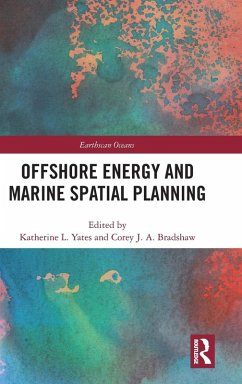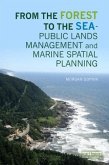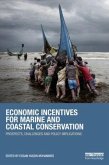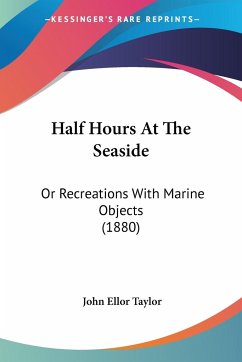Offshore Energy and Marine Spatial Planning
Herausgeber: Yates, Katherine L.; Bradshaw, Corey J. A.
Offshore Energy and Marine Spatial Planning
Herausgeber: Yates, Katherine L.; Bradshaw, Corey J. A.
- Gebundenes Buch
- Merkliste
- Auf die Merkliste
- Bewerten Bewerten
- Teilen
- Produkt teilen
- Produkterinnerung
- Produkterinnerung
Offshore energy generation is a rapidly growing sector, competing for space in an already busy seascape. This book brings together the ecological, economic and social implications of the spatial conflict this growth entails.
Andere Kunden interessierten sich auch für
![From the Forest to the Sea - Public Lands Management and Marine Spatial Planning From the Forest to the Sea - Public Lands Management and Marine Spatial Planning]() Morgan GopnikFrom the Forest to the Sea - Public Lands Management and Marine Spatial Planning179,99 €
Morgan GopnikFrom the Forest to the Sea - Public Lands Management and Marine Spatial Planning179,99 €![Marine Policy Marine Policy]() Mark ZachariasMarine Policy169,99 €
Mark ZachariasMarine Policy169,99 €![Economic Incentives for Marine and Coastal Conservation Economic Incentives for Marine and Coastal Conservation]() Economic Incentives for Marine and Coastal Conservation59,99 €
Economic Incentives for Marine and Coastal Conservation59,99 €![Half Hours At The Seaside Half Hours At The Seaside]() John Ellor TaylorHalf Hours At The Seaside30,99 €
John Ellor TaylorHalf Hours At The Seaside30,99 €![Navigating Our Way to Solutions in Marine Conservation Navigating Our Way to Solutions in Marine Conservation]() Navigating Our Way to Solutions in Marine Conservation102,99 €
Navigating Our Way to Solutions in Marine Conservation102,99 €![Navigating Our Way to Solutions in Marine Conservation Navigating Our Way to Solutions in Marine Conservation]() Navigating Our Way to Solutions in Marine Conservation89,99 €
Navigating Our Way to Solutions in Marine Conservation89,99 €![Oceanography and Marine Biology Oceanography and Marine Biology]() Oceanography and Marine Biology224,99 €
Oceanography and Marine Biology224,99 €-
-
-
Offshore energy generation is a rapidly growing sector, competing for space in an already busy seascape. This book brings together the ecological, economic and social implications of the spatial conflict this growth entails.
Produktdetails
- Produktdetails
- Verlag: Routledge
- Seitenzahl: 326
- Erscheinungstermin: 20. März 2018
- Englisch
- Abmessung: 240mm x 161mm x 22mm
- Gewicht: 655g
- ISBN-13: 9781138954533
- ISBN-10: 1138954535
- Artikelnr.: 43677206
- Herstellerkennzeichnung
- Libri GmbH
- Europaallee 1
- 36244 Bad Hersfeld
- gpsr@libri.de
- Verlag: Routledge
- Seitenzahl: 326
- Erscheinungstermin: 20. März 2018
- Englisch
- Abmessung: 240mm x 161mm x 22mm
- Gewicht: 655g
- ISBN-13: 9781138954533
- ISBN-10: 1138954535
- Artikelnr.: 43677206
- Herstellerkennzeichnung
- Libri GmbH
- Europaallee 1
- 36244 Bad Hersfeld
- gpsr@libri.de
Katherine L. Yates is a Lecturer at The University of Salford, United Kingdom, specialising in spatial planning, distribution modelling, and stakeholder engagement. She is also a National Environmental Research Council Knowledge Exchange Fellow working with the United Kingdom Marine Management Organisation. Corey J. A. Bradshaw is Matthew Flinders Fellow in Global Ecology and Professor in the College of Science and Engineering at Flinders University in Adelaide, Australia. His research is mainly in the area of global-change ecology-how human endeavour and climate fluctuations have altered past, present, and future ecosystems.
Introduction: Marine spatial planning in the age of offshore energy 1.
Marine spatial planning: an idea whose time has come 2. Methods and utility
of ecosystem service trade-off analysis for guiding marine planning of
offshore energy 3. It starts with a conversation: achieving conservation
goals in collaboration with the offshore energy industry 4. Challenges and
opportunities for governance in marine spatial planning 5. Legal aspects of
marine spatial planning 6. Displacement of existing activities 7. Tracing
regime shifts in the provisionof coastal-marine cultural ecosystem services
8. Environmental implications of offshore energy 9. Meaningful stakeholder
participation in marine spatial planning with offshore energy 10. Capturing
benefits: opportunities for the co-location of offshore energy and
fisheries 11. Compatibility of offshore energy installations with marine
protected areas 12. Marine spatial planning and stakeholder collaboration:
advancing offshore wind energy and ocean ecosystem protection in New
England 13. Co-locating offshore wind farms and marine protected areas: a
United Kingdom perspective 14. Conservation challenges in the face of new
hydrocarbon discoveries in the Mediterranean Sea 15. Siting offshore energy
arrays: a case study using interactive marine planning 16. The future of
marine spatial planning
Marine spatial planning: an idea whose time has come 2. Methods and utility
of ecosystem service trade-off analysis for guiding marine planning of
offshore energy 3. It starts with a conversation: achieving conservation
goals in collaboration with the offshore energy industry 4. Challenges and
opportunities for governance in marine spatial planning 5. Legal aspects of
marine spatial planning 6. Displacement of existing activities 7. Tracing
regime shifts in the provisionof coastal-marine cultural ecosystem services
8. Environmental implications of offshore energy 9. Meaningful stakeholder
participation in marine spatial planning with offshore energy 10. Capturing
benefits: opportunities for the co-location of offshore energy and
fisheries 11. Compatibility of offshore energy installations with marine
protected areas 12. Marine spatial planning and stakeholder collaboration:
advancing offshore wind energy and ocean ecosystem protection in New
England 13. Co-locating offshore wind farms and marine protected areas: a
United Kingdom perspective 14. Conservation challenges in the face of new
hydrocarbon discoveries in the Mediterranean Sea 15. Siting offshore energy
arrays: a case study using interactive marine planning 16. The future of
marine spatial planning
Introduction: Marine spatial planning in the age of offshore energy 1.
Marine spatial planning: an idea whose time has come 2. Methods and utility
of ecosystem service trade-off analysis for guiding marine planning of
offshore energy 3. It starts with a conversation: achieving conservation
goals in collaboration with the offshore energy industry 4. Challenges and
opportunities for governance in marine spatial planning 5. Legal aspects of
marine spatial planning 6. Displacement of existing activities 7. Tracing
regime shifts in the provisionof coastal-marine cultural ecosystem services
8. Environmental implications of offshore energy 9. Meaningful stakeholder
participation in marine spatial planning with offshore energy 10. Capturing
benefits: opportunities for the co-location of offshore energy and
fisheries 11. Compatibility of offshore energy installations with marine
protected areas 12. Marine spatial planning and stakeholder collaboration:
advancing offshore wind energy and ocean ecosystem protection in New
England 13. Co-locating offshore wind farms and marine protected areas: a
United Kingdom perspective 14. Conservation challenges in the face of new
hydrocarbon discoveries in the Mediterranean Sea 15. Siting offshore energy
arrays: a case study using interactive marine planning 16. The future of
marine spatial planning
Marine spatial planning: an idea whose time has come 2. Methods and utility
of ecosystem service trade-off analysis for guiding marine planning of
offshore energy 3. It starts with a conversation: achieving conservation
goals in collaboration with the offshore energy industry 4. Challenges and
opportunities for governance in marine spatial planning 5. Legal aspects of
marine spatial planning 6. Displacement of existing activities 7. Tracing
regime shifts in the provisionof coastal-marine cultural ecosystem services
8. Environmental implications of offshore energy 9. Meaningful stakeholder
participation in marine spatial planning with offshore energy 10. Capturing
benefits: opportunities for the co-location of offshore energy and
fisheries 11. Compatibility of offshore energy installations with marine
protected areas 12. Marine spatial planning and stakeholder collaboration:
advancing offshore wind energy and ocean ecosystem protection in New
England 13. Co-locating offshore wind farms and marine protected areas: a
United Kingdom perspective 14. Conservation challenges in the face of new
hydrocarbon discoveries in the Mediterranean Sea 15. Siting offshore energy
arrays: a case study using interactive marine planning 16. The future of
marine spatial planning








